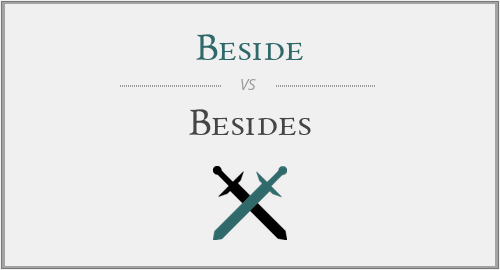Beside
Beside is a preposition of place. It means ‘next to’. The word has originated from the old English adverb ‘be sidan’ meaning by the side. Examples –
· My house is beside Tom’s house.
· We had a nice time sitting beside the fire, singing, dancing and having some great food.
· Don’t sit beside me, I don’t want to catch cold from you.
Beside can also be used in the context of ‘comparison with’.
· My sister has earned her place beside the best singers in the industry.
· Beside other technologies, AI is considered to be the most advanced technology.
There are some interesting phrases that use ‘beside’ –
Beside oneself – emotionally drained because of anger, worry or grief. Example – I was beside myself with disappointment when I had to leave my fulfilling job!
Beside the point/beside the mark – something irrelevant or unimportant. Example – The cost is beside the point if the quality is excellent.
Besides
Besides is used as an adverb as well other than preposition. Both as adverb and preposition, besides means “in addition to”. It is similar to saying moreover, apart from or furthermore. Example –
· Its too early to take a bath. Besides, the tap water is too cold. (Adverb – moreover)
· I wouldn’t have called you if I dint like. Besides, I have begun to trust you. (Adverb – moreover)

· Besides the teachers and the principal, a few selected students will be gong for the trip. (Preposition – apart from/other than).
· Besides the award and certificate, you will also receive a cash prize of $100.
Some more examples that can clarify the meanings further –
· Besides the food, the kids heartily ate the dessert. The amount we spent on them today seems beside the point!
· I left my phone beside the bed. Besides, there are some important documents lying beside the bed.
· Besides talking to his mom during lunch, he likes to have his lunch sitting beside his desk.
Consider the following sentences –
1. To me, classical music sounds boring beside Bollywood music.
2. Besides classical music, I like listening to Bollywood music.
Do you see how the meanings of sentences have changed with the use of beside and besides? The first one compares Bollywood music and Carnatic music, while the second one indicates that the speaker likes both!
Tips to remember
Think of beside without the ‘s’ as be-side or (be)-at-the-side. So, if you want to talk about something on the side use “be-side” i.e. beside.
Think of besides in relation to its meaning – it has an additional ‘s’ and means in addition to. That way, whenever you want to say an additional point, use besides, the one with the additional s!




Have a discussion about this article with the community:
Report Comment
We're doing our best to make sure our content is useful, accurate and safe.
If by any chance you spot an inappropriate comment while navigating through our website please use this form to let us know, and we'll take care of it shortly.
Attachment
You need to be logged in to favorite.
Log In